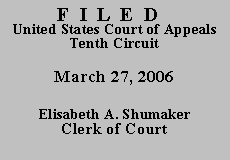

I. Discussion
Greschner filed various claims against prison officials alleging that they were illegally monitoring him and his mail. The magistrate judge recommended that the claims be dismissed for failure to comply with an order to make required monthly payments or show cause why the payments could not be made. Greschner did not respond to the magistrate judge's order and the district court dismissed the complaint.
We have adopted a "'firm waiver rule' which provides that a litigant's failure to file timely objections to a magistrate [judge's report and recommendation] waives appellate review of both the factual and legal determinations" made in the report. Vega v. Suthers, 195 F.3d 573, 579 (10th Cir. 1999); Schrader v. Ray, 296 F.3d 968, 975 (10th Cir. 2002). Before applying the rule against pro se litigants, we require the magistrate judge to inform the pro se party "not only of the time period for filing objections, but also of the consequences of a failure to object, i.e. waiver of the right to appeal from a judgment of the district court based upon the findings and recommendations of the magistrate [judge]." Moore v. United States, 950 F.2d 656, 659 (10th Cir. 1991); see also Talley v. Hesse, 91 F.3d 1411 (10th Cir. 1996) (holding that pro se litigant must be informed that failure to object will, rather than may, bar appellate review of both legal and factual conclusions of magistrate judge). In his December 3, 2004 Recommendation, the magistrate judge informed Greschner that:
Pursuant to Rule 72(b) of the Federal Rules of Civil Procedure, the parties shall have ten (10) days after being served with a copy of this recommendation to file with the assigned District Judge any specific written objections to the findings of fact, conclusions of law, or recommendations of the Magistrate Judge as set forth in this document. . . . A party's failure to file specific written objections to the findings of fact, conclusions of law, or recommendations as set forth in this document will bar . . . appellate review of the findings of fact, conclusions of law, or recommendations of the Magistrate Judge in this document. See Thomas v. Arn, 474 U.S. 140 (1985); Talley v. Hesse, 91 F.3d 1411 (10th Cir. 1996).
(Recommendation at 1-2) (emphasis in original). Despite this specific notice as required by Moore, Greschner filed no objections with the district court and it dismissed the complaint. We perceive no error in the court's application of the firm waiver rule.
We have also recognized, however, that the firm waiver rule "need not be applied when the interests of justice so dictate." Moore, 950 F.2d at 659. We have looked to several factors to determine whether this exception to the rule is warranted, among others: 1) individual circumstances which may excuse the failure to file timely objections, 2) the pro se litigant's subsequent efforts to remedy a failure to object, or 3) the merits of the pro se litigant's claim. See Theede v. U.S. Dep't of Labor, 172 F.3d 1262, 1268 (10th Cir. 1999). In this appeal, Greschner points to no circumstances which excuse his failure to object to the magistrate judge's recommendation.(2) Likewise, Greschner does not allege that he made any effort to remedy his failure to object within the prescribed ten day period. As such, the only possible remaining reason for us to find that the interests of justice weigh in favor of allowing the appeal is the underlying merit of his Bivens and Privacy Act claims.
Here, Greschner alleges a conspiracy among members of the staff and administration of the United States Penitentiary at Florence, Colorado to form an "illegal intelligence unit" the purpose of which is to manufacture false reports and crimes against convicts and citizens in violation of the First, Fourth, Fifth and Eighth Amendments to the Constitution. Greschner further alleges that this conspiracy retaliated against him when he threatened to expose the "intelligence unit" to the media. Greschner alleges, that among other things, this retaliation took the form of the interception, mutilation and destruction of his mail in violation of the Privacy Act and the First, Fourth, Fifth and Eighth Amendments to the Constitution. The district court previously dismissed the Bivens claim, and Greschner has shown no legal error by the court or substantial justification for his Privacy Act claims that would justify application of the firm waiver rule's exception. Accordingly, Greschner is not entitled to another opportunity to object to the magistrate judge's dismissal of his claim.
Because Greschner's failure to object to the magistrate judge's recommendation was without justification, we also deny his motion to proceed on appeal without prepayment of fees pursuant to 28 U.S.C. § 1915(b).
For the foregoing reasons, we DISMISS Greschner's appeal, DENY his motion to proceed pursuant to 28 U.S.C. § 1915(b) and AFFIRM the district court.
Entered for the Court
Per Curiam
*. This order is not binding precedent, except under the doctrines of law of the case, res judicata, and collateral estoppel. The court generally disfavors the citation of orders; nevertheless, an order may be cited under the terms and conditions of 10th Cir. R. 36.3.
2. After examining the briefs and the appellate record, this three-judge panel has determined unanimously that oral argument would not be of material assistance in the determination of this appeal. See Fed. R. App. P. 34(a); 10th Cir. R. 34.1(G). The cause is therefore ordered submitted without oral argument.
1. We construe Greschner's appellate filings liberally. See Cummings v. Evans, 161 F.3d 610, 613 (10th Cir. 1998).
2. Greschner alleges the magistrate judge lacked subject matter jurisdiction to hear his case and recommend its dismissal. This claim, while not barred by our waiver rule, is also without merit. The magistrate judge's subject matter jurisdiction is provided for in 28 U.S.C. § 636(b).